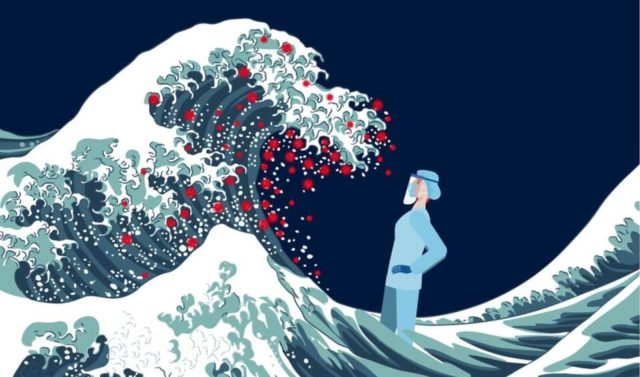Experts are still predicting that a fourth wave will hit during December and herd immunity is no longer an option.
AS THE country experiences a prolonged Covid-19 third wave, many experts are predicting that a fourth wave will hit during December and that herd immunity is no longer an option and the virus is likely here to stay.
According to the weekly epidemiological report from the National Institute for Communicable Diseases (NICD), in the past week most provinces have reported a decrease in weekly incidence risk, except the Free State with a 6.5% increase and KZN with a 6.9% increase compared to the previous week.
The NICD has also reported an increase in new cases among citizens younger than 20 years old, which it believed could explain clusters of confirmed cases in schools following the reopening of private and public schools.
Professor Koleka Mlisana, co-chair of the Covid-19 ministerial advisory committee, said the worst of the third wave had passed.
“Nationally, there was a 7.2% decrease in the number of new cases. The increased number of cases recently seen in the Western Cape were overtaken by KwaZulu-Natal. There was also a decline in hospitalisations over the past weeks with a steady decline in the number of deaths albeit the under-reporting of Covid-19 deaths,” she said.
Mlisana said the emergence of variants that drove resurgences made the likelihood of a fourth wave very high.
“Beta drove the second wave and Delta was responsible for the third wave. Waves have come every four to five months, as evidenced by the previous waves, however, the third wave has been prolonged and behaved differently, making predictions difficult. This is the time to ramp up vaccination as much as possible by December.”
Health Minister Joe Phaahla has maintained that the country aimed to reach the vaccination goal of herd immunity by February 2022 which was a threshold of over 40 million citizens or 70% of the population.
Mlisana said herd immunity, or population immunity, was achieved with high rates of vaccination but emerging Covid-19 variants are highly transmissible even in the vaccinated population.
“Vaccine hesitancy results in lower vaccination rates as well as waning immunity over time and have negatively impacted optimism for population immunity. There is growing evidence that vaccination against infection prevented severe disease and death rather than transmission. Therefore, herd immunity was difficult to achieve,” she said.
Vaccination rates have recently increased to about 250,000 injections a day in the last five days. If the rate was sustained or reached about 300,000 per day for the next four to five months it would mitigate the fourth wave.
However, vaccinologist Professor Shabir Madhi, from Wits University, said herd immunity was no longer an option.
“Covid-19’s evolution has been so rapid that Delta is at least twice as transmissible as the original variant. Herd immunity is no longer a discussion the world should be having. We should start to avoid using that term because it’s not going to materialise or is unlikely to materialise during our lifetimes,” he said.
Madhi said the discussion should rather be centred around how to live with the virus.
“The success with Covid-19 vaccines allows us to do this, without achieving the herd immunity threshold. Even if the country hits its target there will still be outbreaks. Failing to face the reality that herd immunity can’t be achieved means ongoing restrictions will still be enforced, compromising education and livelihoods,” he said.
He added that people need to come to terms with Covid-19 possible being around like influenza.
Multinational professional services network PricewaterhouseCoopers recently published its economic outlook for the country which included forecast scenarios for future infection.
The baseline scenario predicted a lockdown Level 3 to be in place for the whole of August, as Covid-19 infections dropped, followed by Level 1 in September as the third wave tapered out, continuing through October and November. Then Level 2 lockdown in December as infections begin to rise, starting the fourth wave.
The upside scenario saw a Level 2 lockdown as numbers improved, followed by Level 1 in September as the third wave began to dissipate, continuing to October. Then a move to no restrictions in November and Level 1 reintroduced in December as a precautionary move to delay the fourth wave.
The downside scenario would be a Level 3 lockdown with the possibility of more restrictions being added if infection numbers did not improve. Level 2 lockdown in September and October. Level 1 lockdown in November to provide a brief reprieve and Level 2 lockdown in December as infections begin rising and the fourth wave starts.








